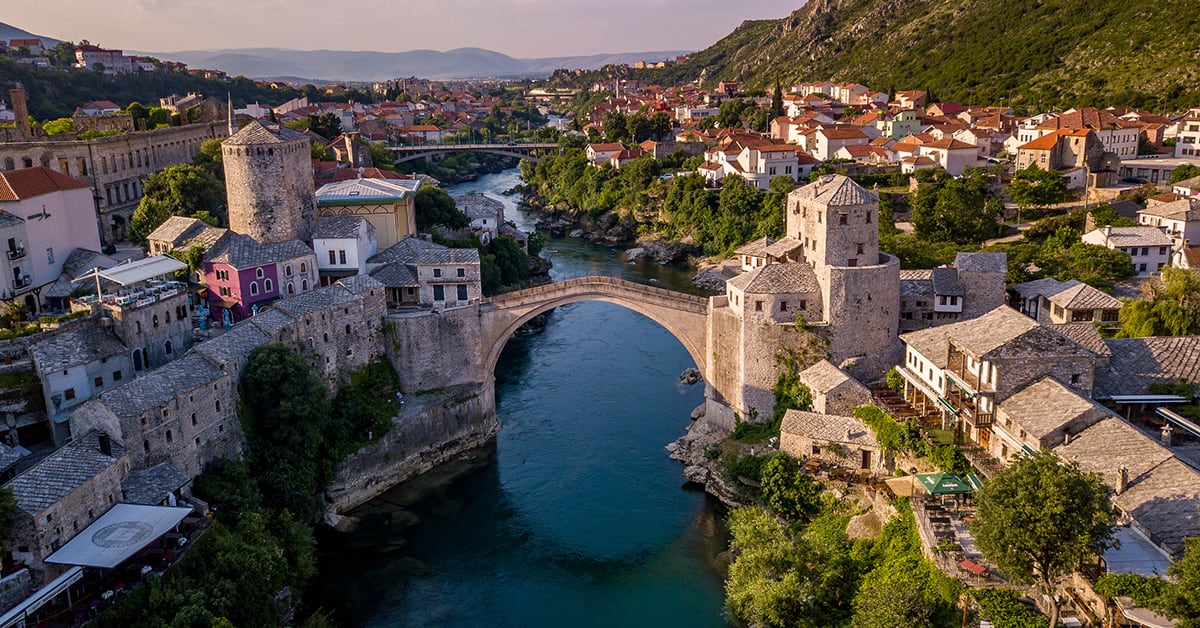Bosnia-Herzegovina competes aggressively with other Balkan countries to attract foreign investment.

|
BOSNIA-HERZEGOVINA: VITAL STATISTICS |
|---|
|
Location: Southeast Europe |
|
Neighbors: Croatia, Serbia, Montenegro |
|
Capital city: Sarajevo |
|
Population (2021): 3,268,196 |
|
Official language: Bosnian, Serbian and Croatian |
|
GDP per capita (2019): $6,108.50 |
|
GDP growth (2020): -0.4% |
|
Inflation (2019): 0.6%+ |
|
Currency: Bosnia and Herzegovina convertible mark; pegged to the euro, limiting monetary policy |
|
Investment promotion agency: Foreign Investment Promotion Agency |
|
Investment incentives available? Reduction of corporate tax rate under some circumstances; exemption from import duties on most capital goods; free trade zones |
|
Ease of Doing Business rank (2019): 90 |
|
Corruption Perceptions Index rank (2020): 111 |
|
Political risks: Political instability |
|
Security risks: Crime; risk of unmarked landmines and unexploded bombs in rural areas |
|
PROS |
|---|
|
Government very concerned to attract FDI |
|
Many reform efforts to improve the business climate |
|
Pursuing World Trade Organization membership |
|
Awaiting candidate status for the EU |
|
Large industrial park for IT companies planned for Sarajevo |
|
Rich in natural resources—potential opportunities in energy, agriculture, timber and tourism |
|
CONS |
|---|
|
Endemic corruption |
|
Slow judicial system, with complex legal and regulatory frameworks |
|
Poor protection of property rights |
|
Lengthy and arduous processes to start new business and obtain permits |
|
Sources: AM Best’s Country Risk Report Bosnia and Herzegovina, Coface, Government of Canada Global Travel Advisory, International Monetary Fund, Reuters, Transparency International, US State Department, World Bank, World Population Review |
|
For more information, check out Global Finance‘s Bosnia-Herzegovina Economic Report data page. |
At the end of the 20th century, Bosnia and Herzegovina (also called Bosnia-Herzegovina or simply Bosnia) was among the spinoffs after the breakup of communist Yugoslavia—winning its independent status only after violent conflict.
Today, each piece of the former Yugoslavia and wider Soviet sphere falls somewhere on the spectrum between communist command economy and Western market economy, and they compete with each other for foreign direct investment (FDI). Serbia, Montenegro and Romania, to name three, boast higher GDP per capita than Bosnia, giving them a competitive edge.
Bosnia-Herzegovina is continuing its shift toward the right end of that spectrum and embracing market principles, even though “we are still a long way from a full market capitalist economy like the United States or the rest of Europe,” says Faruk Hadi, professor of macroeconomics at the University of Sarajevo School of Science and Technology.
The nation’s trade treaties with the European Union, Turkey and other countries, combined with its central location, put more than 600 million potential customers within roughly a day’s drive, according to the Foreign Investment Promotion Agency of Bosnia-Herzegovina (FIPA-BH). Foreign investments are divided roughly equally between greenfield and brownfield projects, with FDI flows concentrated in manufacturing, banking, telecommunications and trade. Bosnia has drawn multinationals such as Volkswagen and McDonald’s; high-end brands such as Gucci; and banks such as Italy’s UniCredit and Turkey’s Ziraat Finance Group.
One draw may be the level playing field. “Foreign investors have the same rights and obligations as domestic entities,” says Nina Pobri, head of the Investment Promotion Department of FIPA-BH. “There are no differences between a company owned by foreigners or by citizens.” Bosnia’s corporate tax rate of 10% is less than Serbia’s 15% or Romania’s 16%, and taxes may be reduced with additional breaks depending on the value of the investment and number of employees involved.
In addition, Bosnia has at least 550 state-owned enterprises, according to the World Bank, many of which lose money, draining the nation of 5% of GDP per year. Some may be candidates for takeover by private investors, although the US State Department warned in a 2020 investment climate report: “Historically, the privatization process in [Bosnia] resulted in economic loss due to corruption.” The country also suffers from a talent leakage, as skilled young workers seek opportunity elsewhere, the World Bank says.
Still, if it takes roughly 80 days to register a new business in Sarajevo, smaller cities outside the capital will gladly jump through hoops to draw in new businesses. “[A] municipality will do everything for you if you have an idea and money to invest,” Hadi says. “They will do everything just to establish a company in their municipality.”



